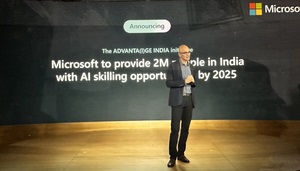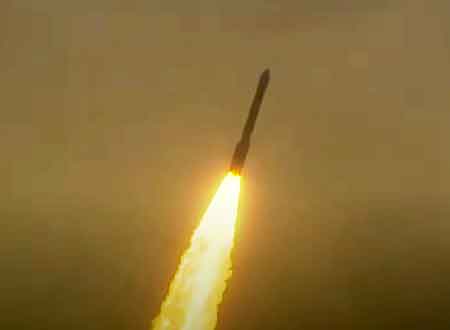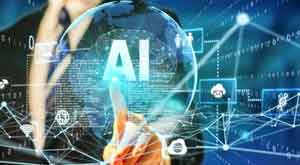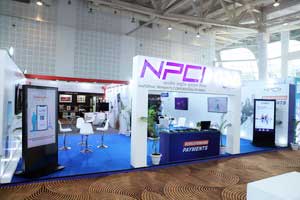Microsoft Chairman and CEO Satya Nadella on Wednesday announced that the company will train more than two million people in India in generative AI skills, to address talent shortage in the AI era.
Addressing an event here, Nadella said that making sure that youth has the necessary skills in order to be able to thrive in this new AI age is the most important thing that we should be doing.
"We are happy to play our role in it. But it's not just the skills but also the jobs that will get created with AI," Nadella told the gathering.
He said that India has the best software developers and has a robust AI engineering community on Microsoft-owned developer platform Github, second only to the US.
"In rural India, people are now participating in the AI economy," he added.
Nadella said that it is very exciting in a country like India, where there is so much investment and so much capital going into the core basic science-driven industries to be able to really come to help India leapfrog even some of the scientific revolution would be very exciting.
The Microsoft CEO said that the company will continue to invest more in the country.
"We have more Cloud regions in India than any other hyperscaler around the world. We have three regions and the fourth one is coming soon. We are definitely investing more in India to make sure that compute with low latency at scale, including the AI, are available for all of you to be able to take advantage," said Nadella.
Microsoft is integrating the power of AI across the entire data and tech stack, seeing increased usage from AI-first start-ups and some of the world's largest companies, he added.
In June last year, Prime Minister Narendra Modi, during his US visit, met Nadella, along with other Big Tech CEOs.
Following the meeting, Nadella's office issued a statement outlining his meeting with PM Modi.
"One important topic was the power of technology, particularly Artificial Intelligence, to help improve the lives of Indians," Microsoft's statement said.
"India is home to one of the most vibrant developer and start-up ecosystems in the world, and Microsoft remains deeply committed to the growth of Indian technology -- that will impact both India and markets across the globe," it added.






Op Sindoor Outreach: Indian delegation meets UAE leaders, discusses shared resolve to combat terrorism
The all-party delegation led by Shiv Sena MP Shrikant Shinde on Thursday held meetings with leaders of the United Arab Emirates (UAE) in Abu Dhabi, reiterating India's strong stance against terrorism.
Terrorism cannot be justified for any reason, says Japanese Foreign Minister in meeting with Indian delegation
Japan, which shares a 'Special Strategic and Global Partnership' with India on Thursday condemned in the strongest terms the growing threat of terrorism as the country hosted a visiting delegation of Indian Parliamentarians led by Rajya Sabha MP Sanjay Kumar Jha.
Greece struck by 6.0 magnitude earthquake, followed by Tsunami warning
The earthquake also prompted the European authorities to issue a tsunami warning. The tremor struck at 6.19 a.m, 58 km north-northeast of Elounda in northeastern Crete, and was 60 km deep, according to initial estimates.
In address to officers, Bangladesh Army Chief draws red lines for Yunus regime
Bangladesh's Chief of Army Staff (COAS), General Waker-Uz-Zaman on Wednesday addressed all officers at the Army Head Quarters (AHQ) in Dhaka, during which he reportedly stated that there will be no Humanitarian Corridor, nor any port allotted to any foreigners till an elected government comes to power in the country.
41 Australian lawmakers write to Yunus, urge 'clear election roadmap' in Bangladesh
In a significant development, a group of 41 Australian Senators and Members of Parliament on Wednesday wrote a letter to Muhammad Yunus, the head of Bangladesh's interim government, urging his administration to immediately and publicly announce a specific, time-bound electoral roadmap,
Beaten and humiliated in Operation Sindoor, Pakistan promotes Army Chief Asim Munir to Field Marshal for 'securing country'
In an unprecedented move after India's hard-hitting Operation Sindoor targetting the terror infrastructure deep inside Pakistan post Pahalgam massacre, the Pakistan Cabinet chaired by Prime Minister Shehbaz Sharif on Tuesday announced its decision to promote the Chief of Army Staff (COAS) General Asim Munir to the rank of Field Marshal.
Amid global criticism, Bangladesh court grants bail to actress Nusraat Faria
Bangladesh's leading actress Nusraat Faria was granted bail by a Dhaka court on Tuesday in an attempted murder case of one Enamul Haque related to the July 2024 movement.
Dia Mirza spreads buzzing awareness on World Bee Day: “Bees are poets of the planet
On World Bee Day, actor and environmental advocate Dia Mirza took to social media to urge everyone to recognize the critical role bees play in sustaining life on Earth.